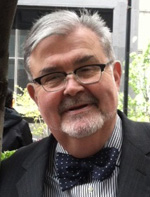A Powerful Example of Servant Leadership
Richard Murphy
Adapted from huffpost.com/entry/ true-servant-leadershipf_b_3016044

In 2013, New York City and our nation lost such a leader as Richard Murphy, whose legacy should serve as an example of true servant leadership for all social entrepreneurs, innovators and leaders.
The list of his innovations runs very long, yet one can find only one image of him in a Google search, and not much written about him before his obituaries. But to many leaders in the youth development field in New York City and across the country, he was a giant.
Richard is a role model for a more selfless than self-aggrandizing leadership, and the lessons I learned from his example are good for every leader to reflect upon.
Richard did not focus on scaling organizations or programs, but scaling ideas, and the more people stole, adapted, and built upon those ideas, the better, in his opinion.
The number of people Richard mentored is staggering. Richard did not focus on getting himself in the spotlight, because he was too busy shining it on everyone else, especially women and people of color. The impact of his work is much bigger and more sustainable because he invested his time, talent, and care in building leaders whose impact multiplied his own.
When Richard was New York City’s Commissioner for Youth Services, Moisés Pérez, Executive Director of Alianza Dominicana in Washington Heights, was having trouble reaching him and heard one of the kids at his center say, “I talk to Richard all the time.” Moises sat next to the kid as he dialed up Richard and got
through right away. Moisés grabbed the phone from the kid, and Richard explained: “Moisés, you know I’ll get back to you but the kids don’t know that, so we have to always be there for them.” And even when they messed up, he was forgiving and stuck by them because someone had to be there for them.
Richard fought hard for systems to change. He always pushed for higher quality. He was especially critical of programs that treated kids as problems to be fixed rather than assets to be developed, and he believed in putting kids in charge and hiring them to do work whenever possible.
A fighter for social equality and justice, Richard never lost his grounding in service to the community. For years, Richard, in his trademark navy blue suit and polka-dot bow tie would walk the streets of Harlem with day-old bread he picked up from local bakeries to make sure kids had something to eat before school. On Fridays, he’d give the kids quarters and invite them to call him if they got hungry. He was a true servant leader.
We need more Richard Murphys.
“The greatest leaders recognize that they’re here to serve, not to be served.”
—KEN BLANCHARD